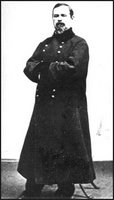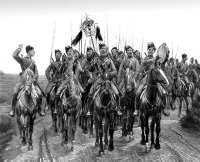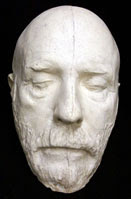
Before posting the last of the series on "How to Become a Corps Commander," I thought it best to separate the chaff of my impressions of McDowell from the wheat of analytic comparison that represents this series. This post, then, is summary and informal.
Yet another publishing season has come and gone without any scholar or publisher troubling him/herself with a biography of McDowell. You remain at the mercy of websites like this one. Should you ever wish, in the future, to contest my picture of Civil War publishing as broken, check books-in-print first to see if there is yet a McDowell bio. If not, cut
me the break please. This is an ongoing disgrace.
Irvin McDowell was one of those rare high command figures who was on active duty when the war broke out, although he was not a member of the high command at first. He hailed from Ohio and was assistant adjutant general in Washington in April '61.
In the general pattern of patronage, at the war's outbreak the active duty officer was generally holding a mess of pottage. The connections employed to secure West Point appointment were broken by time and change of political fortunes. Consider William Franklin: his appointment to the USMA was arranged by Buchanan when Buck was an MC. His presence in Washington as engineer of the Capitol dome construction had much to do with
President Buchanan. Serving officers were, by and large, politicaly orphaned before hostilities commenced.
Not Irvin McDowell. He was cousin to Ohio's sitting Gov. William Dennison, who had replaced ex-Gov. Salmon Chase, the treasury secretary. Chase and Dennison ran the Ohio Republican machine with a little help from political generals like Jacob Cox and a future presidents Garfield and McKinley. McDowell was one of the handful of prewar officers, like Sumner, Keyes, and Heintzelman, who was known as a Republican and an Abolitionist. He had a backer in the Cabinet and a cousin in the governor's mansion.
For reasons ostensibly having to do with overwork in spring and summer of 1861, Simon Cameron delegated large portions of his secretary of war portfolio to Salmon Chase. As Cameron was Seward's creature, and an unhappy one, the delegation of his work to Seward's nemesis Chase is worth studying in a future post.
The prodigious war work performed by Chase earned him the courtesy title "General" and for this work he needed military advice. He recruited capitol engineer William Franklin (ousted from his position by Seward's protege Meigs) and Irvin McDowell. J.G. Randall aptly calls this duo Chase's "military cabinet." One of their more substantial projects was the development - under Chase's direction - of the table of equipment and organization for USV regiments.
The duo of McDowell and Franklin became one of the best known military combinations in Washington, with the pair sitting in Cabinet meetings, drafting operational plans, and acting as a de facto planning group for Chase and even Lincoln. When Scott needed bypassing, the McDowell/Franklin team was there for the civilians. They foreshadowed the use to which McClellan would be put after Bull Run. They were revived, as a team, during McClellan's illness in December of 1861.
As McClellan would be foisted upon an unwilling Scott, so was McDowell. When Chase arranged McDowell's promotion from major to BG, Scott became outraged because he was against
grade inflation and because he had not been consulted on the matter (see Beatie, Vol. 1). Lincoln (and Chase) made McDowell Scott's deputy and then used McDowell and Franklin (again) to plan the advance into Virginia without Scott's involement.
Among McDowell's relatives, we should mention that Gen. John Buford, of cavalry fame,
was married to McDowell's cousin; and McDowell
met his wife through the old Whig General Wool, whose ADC McDowell had been. Oddly enough, when Chase's man McDowell became damaged, Chase's man McClellan took charge. When McClellan became damaged, Gov. Dennison's relative (by marriage)
Napoleon Buford was sought as Mac's replacement (see
here and
here).
Again, exploring the Chase dimension, note that General Wadsworth, the upstate politician heading the anti-Seward wing of the New York Republican Party (i.e. the Chase wing) rocketed from volunteer ADC to McDowell to brigadier general
immediately after Bull Run.
Note also McClellan's decision - under Chase's and Dennison's sponsorship - to keep McDowell on board after Bull Run. After McDowell allows the Radicals to use him in a plot to overthrow McClellan, it is Franklin who intervenes on McDowell's behalf to mend fences with Mac. All this is grist for that future biography.
After second Bull Run, McDowell ends up as as president of the Court for investigating cotton frauds. This is a sensitive post for any friend of Salmon Chase because Chase has married his daughter off to the biggest cotton mill owner in the North, William Sprague, ex-governor of Rhode Island. Sprague manages to get a lot of cotton during McDowell's tenure.
McDowell's brother Malcom, another personal ADC, later became paymaster of the Army of Tennessee. In an 1864 letter to his father, Gen. Frank Blair complains that McDowell's paymaster brother is running
Treasury-authorized cotton deals through enemy lines on behalf of Governor Sprague. Irvin was not minding the cotton fraud desk
as diligently as he might have.

Finally, on a trivial note, if you read soldiers' accounts of encounters with McD, you tend to find him wearing "that hat." They all seem offended by the hat but none bother to describe it. I once asked
Thomas P. Rowland, who was then researching a McDowell bio, what on earth the hat might have been. He thought it a souvenir of McDowell's Indian sojourns, a toppee.
It's as much biography as has emerged, but I'll take what I can get.
(A non-period reproduction of any old toppee is shown at right.)









